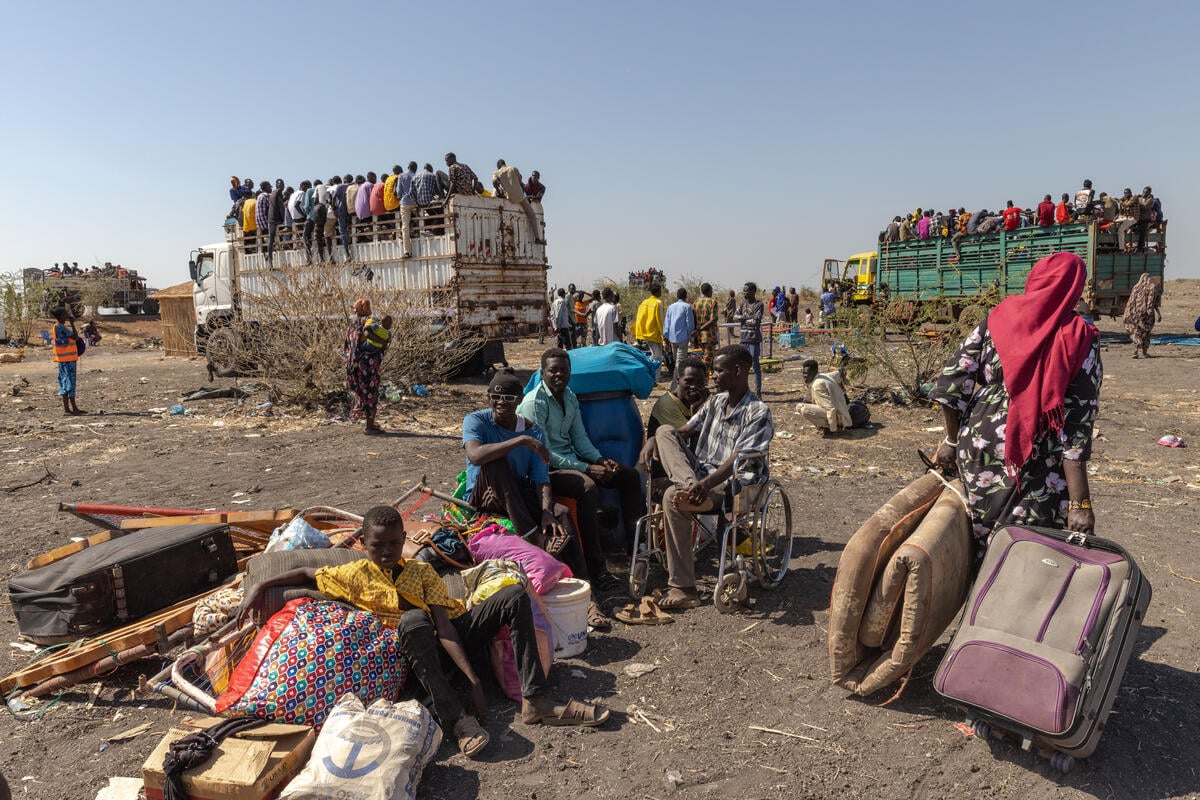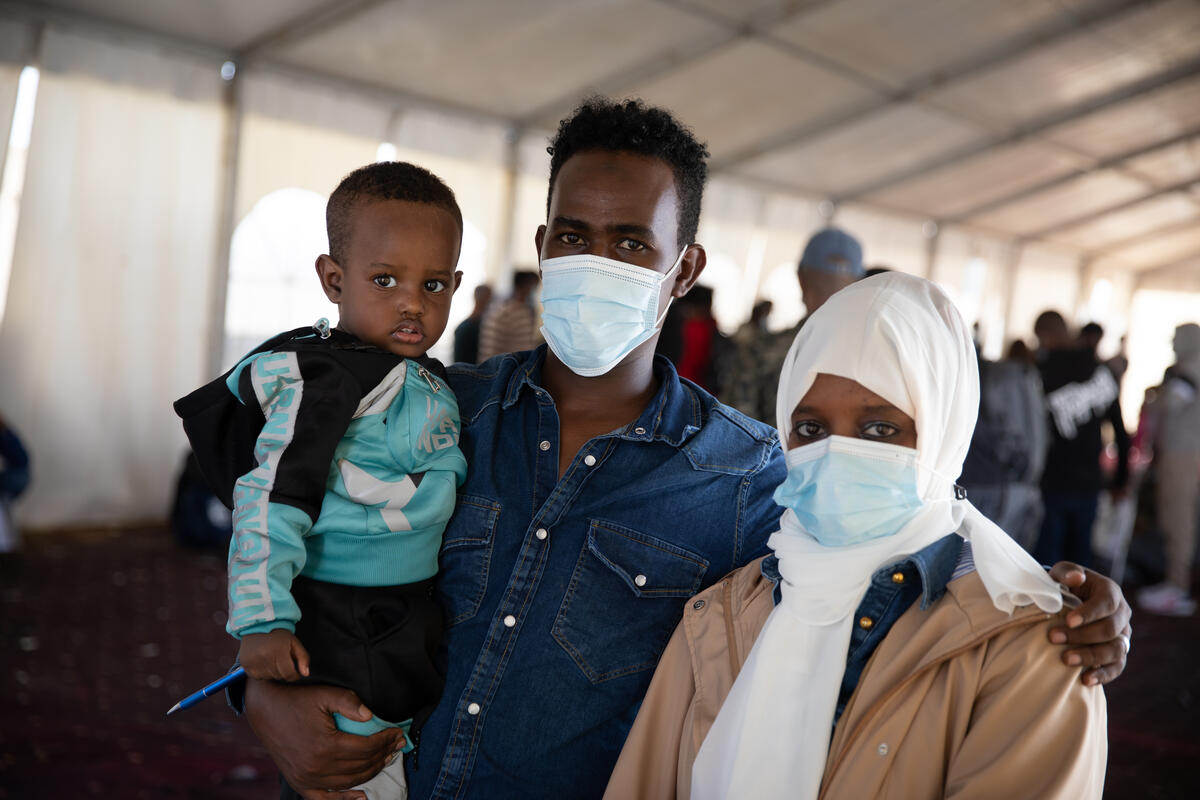One Woman's Quest: Marian's hopes rest on her son as she searches for her husband
One Woman's Quest: Marian's hopes rest on her son as she searches for her husband

TRIPOLI, Libya, March 28 (UNHCR) - The one anchor and light in Marian's* hard life was her love for her husband, Hassan. So when the migrant worker went missing in Libya in 2011, she decided to leave her in-laws on the Red Sea coast of Sudan and cross the Sahara with their young son to search for him.
Two years on, Marian stills hopes to find her missing spouse as she struggles to make a go of things in Tripoli. But while she worries about the future, she at least has her beloved young son, Omar - and the 10-year-old also offers them both a chance for a better life.
The deep mother-son bond is clear and her decision to take him on the search for Hassan is more understandable when one discovers that Marian's own parents were killed in 1988 during Eritrea's war of independence from neighbouring Ethiopia. She could not bear being separated from her own son.
Today, Omar is doing really well at school in the Libyan capital and his mother earns enough for their board and keep by working as a domestic maid and as a babysitter at a community development centre supported by UNHCR and run by the Danish Refugee Council and Al Wafa Charity Society. The two asylum-seekers have been registered with UNHCR as vulnerable individuals.
Marian still faces an uncertain future, but that is nothing new for this resilient woman. The most important thing for Marian is her son's future and that's why she is grateful to UNHCR for helping her son enrol in school.
Emmanuel Gignac, chief of UNHCR's mission in Libya, says it is vital to help refugee children like Omar get a basic education as this improves their prospects in life. "Since we resumed our activities in Libya in [August] 2011, in collaboration with Al Wafa Charity Society, we have run vocational training and educational programmes for refugees and asylum-seekers, especially those in vulnerable situations," he noted.
Marian has never had such an opportunity. After her parents were killed, she was looked after by an uncle, who in 1988 moved his family to neighbouring Sudan because he thought it was safer. They stayed there until the war ended in 1991, returning to Eritrea.
It was not the happy ending they had hoped for and they became disenchanted with the corruption and autocratic rule in Eritrea, especially when the government introduced compulsory military service for men and women after a border dispute with Ethiopia escalated into war.
In 1999, Marian's uncle decided to return to Port Sudan on the Red Sea with Marian and his family. The young woman eventually met Hassan, a local man. They got married and Omar was born in 2003. Five years later, Hassan left for Libya in search of better work opportunities.
Every month, Hassan sent money to Marian and regularly called by phone. But when conflict erupted in Libya in February 2011, Hassan stopped remitting funds and the phone calls became less frequent. When they ceased, Marian decided to go and look for him. With financial help from friends, she and Omar headed off last June on a bus crowded with people seeking to reach Libya. "We were packed in such a way that I felt our souls would squeeze out," she recalled.
The passengers included Pakistanis, Bangladeshis, Sudanese and Somalis and Omar was the only child on board during what turned out to be a long and arduous journey. They had limited food and water and some passengers died during the journey, which ended when the bus was involved in an accident. In the chaos, Marian lost her luggage and her one photo of Hassan.
They found another lift but the ordeal continued: they were robbed by police before being detained by armed men and kept in the Libyan desert oasis city of Sabha, some 640 kilometres south of Tripoli. Marian says she was forced to hand over more money before managing to escape with Omar.
A kindly old man helped her find a bus for Tripoli and once she reached the big city, Marian started looking for Hassan, but kept on running into dead ends. Marian's quest continues but she realized soon after arriving in Tripoli that she would need a job to survive and provide for her son.
Last October, she heard that UNHCR was looking for someone to look after the children of refugees. She applied and now works five days a week at the community development centre looking after mainly Syrian children while their parents register with UNHCR.
And with UNHCR's support, Omar enrolled in primary school. His grades have been outstanding in all subjects and he has made lots of new friends. It might be a bit early to think of careers, but Omar says he wants to become a surgeon. "If I treat people," the youngster says, "God will reward me." He has the right attitude: forward-looking, optimistic, curious and confident.
His mother, meanwhile, is proud that her son is excelling at school and she is also relieved to have a source of income. She wants the best for Omar, but she still worries about the future as she continues searching for her missing husband, now with the help of the International Committee for the Red Cross. She also worries about the lack of asylum legislation and continuing instability in Libya.
"The absence of an asylum system in Libya," UNHCR's Gignac explains, "means that people of concern continue to face serious challenges. While things have evolved and improved since the end of the conflict and the authorities are increasingly aware of the protection needs of asylum-seekers and refugees, there is still a long way to go."
By Emanuela Paoletti in Tripoli, Libya









